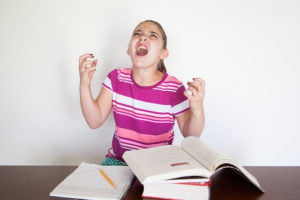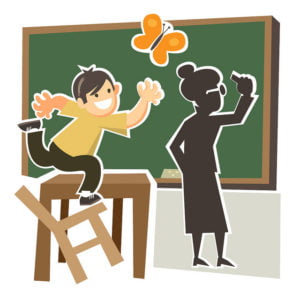A child bolts around the classroom even after repeated directions to remain seated. He has verbal outbursts and constantly interrupts other students who are talking. This child could be displaying forms of ADHD.
The National Institute of Mental Health (NIH) considers ADHD “a brain disorder marked by an ongoing pattern of inattention and/or hyperactivity-impulsivity that interferes with functioning or development.” People with ADHD may show both inattention and hyperactivity-impulsivity, or one may dominate.
Symptoms of ADHD
 The NIH breaks ADHD down into three types: inattention, hyperactivity, and impulsivity. ADHD affects millions of children and often carries over into adulthood. Symptoms may decrease but are usually present to some degree.
The NIH breaks ADHD down into three types: inattention, hyperactivity, and impulsivity. ADHD affects millions of children and often carries over into adulthood. Symptoms may decrease but are usually present to some degree.
Here are a few symptoms to look for to help recognize if you, or someone you know, has ADHD.
ADHD predominantly inattentive presentation:
- Fails to give close attention to details or makes careless mistakes
- Finds paying attention challenging
- Struggles to listen
- Rarely follows through with given instructions
- Avoids or dislikes tasks requiring consistent mental effort
- Regularly loses belongings
- Is easily distracted
- Is forgetful in daily activities
ADHD predominantly hyperactive-impulsive presentation:
- Fidgets with hands or feet or squirms in chair
- Has difficulty remaining seated
- Runs about or climbs excessively in children; extreme restlessness in adults
- Difficulty engaging in activities quietly
- Acts as if driven by a motor; adults will often feel inside as if they are driven by a motor
- Talks excessively
- Blurts out answers before questions have been completed
- Difficulty waiting or taking turns Interrupts or intrudes upon others
If the individual meets the criteria for both inattention and hyperactive-impulsive she has combined ADHD presentations. Children with ADHD can face more challenging scenarios in life.
Finding it hard to focus in the classroom or to sit still can lead to poor academic performance. Some teachers and students may even pass judgment on a child with ADHD. Some peers and adults will refuse to accept a child with ADHD because of their behavior, which can result in low self-esteem.
How to Treat ADHD
ADHD does not need to be left untreated. Many therapies and methods exist to reduce the symptoms of ADHD and improve the quality of life.
1. Behavior therapy

Teachers and parents can implement behavioral strategies to give consistency and establish clear rules in the home and school environment. A token reward system is one strategy to use to give positive and negative feedback. If instructions or a task are completed a marble goes into the jar. If a task is not completed, two marbles are taken out. A reward is given based on the number of marbles in the jar at the end of the day.
2. Psychotherapy
Older children with ADHD can benefit from psychotherapy. Itcreates an environment where they can express their frustrations, explore behavior patterns and come up with solutions to combat their symptoms.
3. Parenting skills training
A young child with ADHD needs overwhelming support from his family. Often, the child might feel ridiculed at school. It’s important to create a safe place at home by learning your child’s behaviors and how you can react.
4. Family therapy
Not every member of the family might be as understanding of the one with ADHD. Setting aside time to meet with a family therapist will help manage stress levels. The child needs to know he is loved and accepted by the family.
5. Social skills training
Learning proper social behaviors will help children assimilate into the classroom culture.
6. Relaxation exercises
Never underestimate the power of relaxation. Trying different yoga exercise or forms of breathing can help a child with ADHD calm down.
7. Modified diet
For those with ADHD, most experts suggest a modified diet which involves eliminating foods thought to increase hyperactivity, such as sugar, and common allergens such as wheat, milk, and eggs. Some diets recommend avoiding artificial food colorings and additives. Caffeine use as a stimulant for children with ADHD can have adverse effects and is not recommended in the diet.
8. Exercise
Encourage children to move. Not only is exercise a massive health benefit, regular exercise may have a positive effect on behavior in children with ADHD when added to treatment.
What Should Christians Know About ADHD and its Treatment?
The number of children diagnosed with ADHD in the United States continues to rise. Turning to forms of medication for ADHD has taken families and schools by storm to such an extent that kids are routinely referred for psychiatric care. Most people default to the idea the child has a brain disease and needs medication to cure a chemical imbalance.
Not every doctor agrees that medication is the course to follow for a child with ADHD. Dr. Leon Eisenberg, known as the scientific father of ADHD, viewed ADHD as a fictitious diagnosis which consists only of identifying a list of behavioral symptoms. Indeed, a medical diagnosis does not seem to capture the essence of this problem and is too simple an answer to a complicated issue.
 Christians often contemplate the use of ADHD medication for children. Some believe medication used during the younger years will become a gateway drug in the future or have adverse side effects to their child’s development.
Christians often contemplate the use of ADHD medication for children. Some believe medication used during the younger years will become a gateway drug in the future or have adverse side effects to their child’s development.
Medication is not always the answer, especially for such a complex issue like ADHD. Here are a few practices Christians can put in place to help their child struggling with ADHD.
Become the advocate
Your child will need to know he has your support no matter what. Become his voice at school to ensure teachers are working toward your child’s success as well. Often, children with ADHD are alienated or seen as a nuisance. You can become a part of a team that decides what kind of services the school has in place for children with ADHD.
Boost self-esteem
Constant negative feedback can take a toll on a child’s confidence. Just imagine if you were in a setting where almost everything you did was seen as wrong or bad. Set aside special time during the day for one-on-one connection. Notice how your child is gifted and nurture that gift.
Praise every success
 Notice and give praise for your child’s success, no matter how small it might seem to you. Encouragement can work wonders, especially if the child is accustomed to negative comments. It takes even more praise to reverse the effects of negative feedback.
Notice and give praise for your child’s success, no matter how small it might seem to you. Encouragement can work wonders, especially if the child is accustomed to negative comments. It takes even more praise to reverse the effects of negative feedback.
Christians should take time to perform their own research about treatment plans for ADHD. Every family must make an individual choice of whether medication is the right next step for their child.
Impulsive and inattentive children need parental love, guidance, and discipline before any type of medical intervention. Christian counselors in San Deigo can help navigate behaviors and create different strategies to implement during daily interactions with children with ADHD.
“Can’t Study,” courtesy of amenclinicsphotos ac, Flickr Creative Commons, CC0 License; “School,” courtesy of amenclinicsphotos ac, Flickr Creative Commons, CC0 License; “Medication,” courtesy of jarmoluk, pixabay.com, CC0 License; “Street scene,” courtesy of London Scout, unsplash.com, CC0 License

